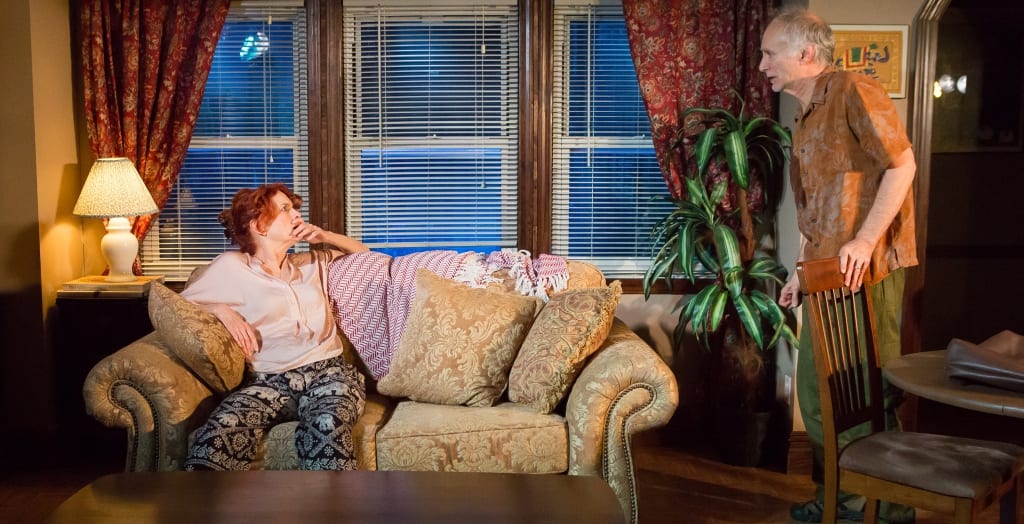Every unhappy marriage is unhappy in its own way, and that famous first line might be applied to Max Baker’s play about the disintegration of marriage as boredom sets in to replace love’s youthful bliss. What’s left is a preoccupation with death: the death of everything and everyone. That is what has happened to Hal and Bee’s marriage in Hal & Bee presented by the Stable Cable Lab Co and New Light Theater Project at 59E59.
For Baker’s couple marriage is a gameshow of wits, a battle between an alcoholic and a pot-head, and a tug of war to go or stay when their apartment is about to bought by a big realty conglomerate. The inevitable breakdown of their marriage occurs after the accumulation of all the warring: its tedium exhausting the warriors.
Director Sarah Norris has assembled a cast of actors more than capable of the rapid linguistic and downward spiraling of this tale which the New York audience knows only too well. Candy Buckley, Jeff Hayenga, and Lisa Jill Anderson are each so facile with Baker’s language.
Hal is an agoraphobic pot-head who was once a respected writer; Bee is heavy drinker who has been a museum administrator for nineteen years. Both are unhappy and assume a glib take on almost everything. They have a daughter, Moon: a name that harkens back to Hal and Bee’s hippy youth. Moon is a typically disgruntled millennial played with deft millennial indifference by Lisa Jill Anderson. She is of her parents’ ilk – a pot-smoking graduate student studying, yet disparaging her education as expensive, useless and a waste of time.
What we are led to believe within the first 15 minutes of the play is that the impending sale of their apartment will be the force that drives the play. But it doesn’t. It’s another intrusion. It is the entrance of an exterminator, the “bug man” (played with charming indifference by Ian Poake). He’s Russian, a common-sense philosopher whose pesticide ironically impacts on the marriage of Hal and Bee. Hal and the bug man’s encounter is the actual turning point of the play as it forces Hal out of the house, and drives Bee – who now believes herself to be alone, her life devoid of combat – to consider suicide, which would actually satisfy Hal’s repeated euphoric fantasies of “uxoricide.”
Mr. Baker’s clever dialogue is sharp and sardonic and funny. The entire cast takes us on his cultural roller coaster, including the dark fantasy tunnels of marital resentments and disappointments, with an intelligent adroitness that is truly admirable. Brian Dudkiewicz’s set is effectively claustrophobic, full of the mementos and the cultural clutter of the couple’s marriage.
We are nearly exhausted after this ride, but not exactly exhilarated as the play draws to its inconclusive and somewhat maudlin end. Still, this may be Baker’s message with Hal & Bee: marriage is messy and all that we can do, if we are sick and tired of our irreconcilable aspects, is to shroud ourselves together and wait for the coffin lid to drop.

